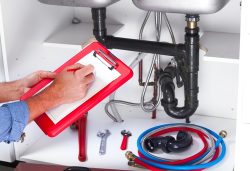The Ultimate Guide to Preventing Clogs in Your Home’s Plumbing
 The Ultimate Guide to Preventing Clogs in Your Home’s Plumbing
The Ultimate Guide to Preventing Clogs in Your Home’s Plumbing
Clogged drains and pipes are a common issue for homeowners that can cause frustration, inconvenience, and even expensive repairs. But you can prevent clogs in your home’s plumbing by taking a few simple measures. In this post, we’ll provide you with the ultimate guide to preventing clogs in your home’s plumbing.
1. Be Mindful of What Goes Down the Drain
Clogs often result from items being flushed down the drain that should not be. To prevent clogs, avoid flushing or pouring down the following items:
– Grease, fats, and oils: These substances can solidify and block your pipes. Instead, let them solidify and then dispose of them in the trash.
– Coffee grounds: These can accumulate in pipes and create sludge that clogs drains.
– Eggshells: These can create small granular waste that clings to the inside of your drain.
– Wipes, feminine hygiene products, and paper towels: These products don’t dissolve easily and can clog pipes and sewer systems.
2. Use a Drain Strainer
A drain strainer can help keep larger debris like food scraps, hair, and soap residue from entering your drain. This can reduce the number of clogs in your sink or bathtub. Simply install the strainer over your drain and empty it periodically to prevent accumulation.
3. Clean Your Drains Regularly
Without regular cleaning, debris and residue build-up can cause clogs. To prevent clogs, once a month, add baking soda and vinegar to your drains. First, pour half a cup of baking soda into your sink, and then follow it with a cup of vinegar. After 10 minutes, flush with hot water. This will help dissolve any buildup inside the pipes.
4. Flush Hot Water Down the Drain
To help dissolve any buildup inside your pipes, flush hot water down your drain once a week. This will help keep your pipes clear and prevent debris from sticking to the interior walls of your pipes.
5. Don’t Use Chemical Drain Cleaners
While chemical drain cleaners are marketed to be an easy solution to clogs, they can be more harm than good in the long run. They contain harsh chemicals that can erode your pipes, leading to costly repairs. Plus, these chemicals can also harm the environment as they are washed out to the sewage systems. Instead, opt for natural or mechanical solutions to unclog your pipes, or contact a professional plumber.
6. Fix Leaks Immediately
Leaking pipes and faucets can also cause clogs. They can activate the buildup of mold and minerals that accumulate in your pipes and drains. If you notice leaks, fix them immediately to prevent future clogs.
7. Remove Hair from Your Drains
Hair is another common cause of clogs in drains. Invest in a hair catcher for your shower drain to prevent excessive hair from building up and blocking your drain. Regularly clean these catchers to prevent accumulation.
8. Install Properly-sized Pipes
Your pipes should be properly sized to prevent clogs. Pipes that are too small can result in inadequate flow, leading to clogs. Similarly, pipes that are too large can promote standing water, which can encourage debris buildup in your pipes. Consult a plumbing professional for the appropriate sizing of your pipes.
9. Avoid Putting Non-Dissolvable Items in Garbage Disposals
Garbage disposals are an easy way to dispose of food waste, but not all waste should be put in the garbage disposal. Avoid putting non-dissolvable items down the garbage disposal, such as bones, fruit pits, and non-food items. Additionally, don’t overload your garbage disposal and always run water while the disposal is in use to help flush food scraps through the drain.
Final Thoughts
Preventing clogs in your home’s plumbing system requires being mindful of what goes down the drain, using drain strainers, regular cleaning and flushing with hot water. Additionally, do not use chemical drain cleaners, fix leaks immediately, employ hair catchers in your shower drains, install pipes of appropriate size, and avoid putting non-dissolvable items in your garbage disposal. By taking these preventive actions, you can save yourself the stress and cost of dealing with clogs in the future.
Categorised in: Plumbing Maintenance

 The Ultimate Guide to Preventing Clogs in Your Home’s Plumbing
The Ultimate Guide to Preventing Clogs in Your Home’s Plumbing